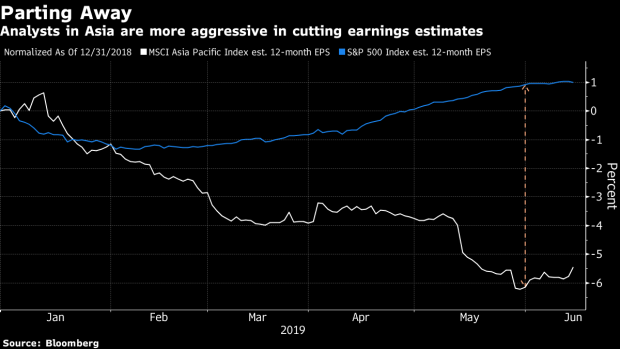Jun 17, 2019
Asia Equities Are on a Wobbling Foundation as Earnings Outlook Dims
, Bloomberg News

(Bloomberg) -- The pillars of Asia’s stock markets are shaking: Sentiment is fragile, valuations are not all that cheap and earnings forecasts continue to decline.
The MSCI Asia Pacific Index’s estimated 12-month forward earnings per share dropped to a 19-month low at the end of May. Analysts covering these companies have cut profit estimates by 5.4% this year. Compare that with their counterparts in the U.S., who revised their forecasts for S&P 500 Index stocks up by 2.5%, according to Bloomberg data.
The power struggle between the U.S. and China has weighed on trade and companies’ business activities since last year. With U.S. President Donald Trump threatening more tariffs on China and other countries, worries have arisen about corporate profit sustainability and even potential for a recession.
Trade tensions appear to be exacerbating the downward move in Asia’s earnings cycle, according to Societe Generale SA.
Frank Benzimra, head of Asia equity strategy at the firm, said in an interview that the earnings downgrade phase in Asia is still underway, especially in the semiconductor sector, though he expects profit growth for Asia companies to be “marginally positive” in 2019. Semiconductors have been hard-hit amid the trade tensions due to turmoil in the region’s supply chain.
UBS Global Wealth Management cut its Asian 2019 earnings growth prediction to 5% from a previous 6.4%. Hartmut Issel, the firm’s head of APAC equities, wrote in an email that if the negotiations between China and the U.S. break down completely, “we forecast roughly flat or even negative earnings growth in 2019.”
Asia equities started the year strongly before the trade-inspired plunge in May, and the MSCI Asia Pacific Index is still up more than 5%. The gauge gained a second week last week as the Federal Reserve’s dovish comments pushed up expectations for an interest rate cut in the U.S.
Strategists at Nomura say Asian countries’ monetary easing and policy support may prevent profit growth from falling off a cliff. An earnings recession could be avoided if central banks and government could have ample support, according to a May 24 note written by Chetan Seth.
And of course, the ultimate obstacle is the trade spats. If the G-20 meeting could serve as an opportunity for leaders of both side to step back and return to the negotiation table with mutual respect, sentiment will improve, CMC Markets Singapore’s strategist Margaret Yang said in an email.
But for now, earnings in Asia look set to struggle.
“It’s a downtrend,” SocGen’s Benzimra said. “Maybe a little bit of stabilization, but nothing really exciting” like re-acceleration or signals to re-enter emerging markets.
To contact the reporter on this story: Moxy Ying in Hong Kong at yying13@bloomberg.net
To contact the editors responsible for this story: Divya Balji at dbalji1@bloomberg.net, Joanna Ossinger
©2019 Bloomberg L.P.





